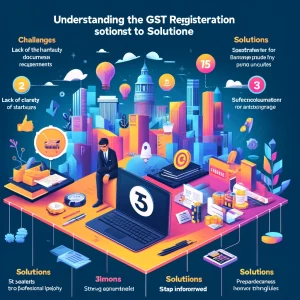Common Challenges Faced by Bangalore Businesses in GST Registration and How to Overcome Them
In the bustling business hub of Bangalore, known as the Silicon Valley of India, navigating the complexities of Goods and Services Tax (GST) registration can be daunting. Whether you’re a startup or an established enterprise, understanding the GST registration process is crucial for compliance and operational efficiency. This article explores the common challenges faced by Bangalore businesses during GST registration and provides practical solutions to overcome them.
Table of Contents
- Understanding the GST Registration Process
- Key GST Registration Requirements
- Specific Challenges for Startups
- Common Issues Faced by Established Businesses
- How to Overcome GST Registration Challenges
- Frequently Asked Questions
- Conclusion

Understanding the GST Registration Process
The GST registration process involves several steps that ensure a business is legally recognized to supply goods and services. In Bangalore, businesses must follow a systematic procedure that includes:
- Filing an application on the GST portal
- Submitting required documents
- Verification by GST officers
- Issuance of the GST registration certificate
For many, the challenge lies in navigating this multi-step process without errors or delays. Each step requires careful attention to detail, ensuring that all information is accurate and all documents are correctly submitted.
Firstly, businesses must file an application on the GST portal, providing basic details such as PAN, email ID, and mobile number. Following this, they need to submit required documents, which vary depending on the type of business and its operations. The GST officer then verifies these documents, and if everything is in order, the business is issued a GST registration certificate.
Key GST Registration Requirements
To register for GST, businesses must meet specific requirements, including:
- Valid PAN of the business
- Proof of business registration
- Identity and address proof of promoters/directors
- Business address proof
- Bank account details
- Digital signature
Each of these requirements serves a specific purpose in ensuring the legitimacy and transparency of the business. The PAN is essential for tax purposes, while proof of business registration confirms that the business is legally recognized. Identity and address proof of promoters/directors help in establishing the authenticity of the individuals running the business. Business address proof ensures that the business operates from a legitimate location, and bank account details are necessary for financial transactions related to GST. Finally, the digital signature is crucial for the online submission and verification of documents.
Specific Challenges for Startups
Startups in Bangalore often face unique challenges during GST registration, such as:
- Lack of clarity on the registration process
- Insufficient documentation
- Difficulty in understanding compliance requirements
These hurdles can delay the registration process and impact the business operations negatively. Many startups, being new to the business environment, might not have all the necessary documentation readily available. Additionally, the complexity of GST regulations can be overwhelming for new entrepreneurs, making it challenging to understand the exact requirements and compliance measures.
Moreover, startups often operate with limited resources and manpower, making it difficult to dedicate sufficient time and effort to the registration process. The lack of experience and expertise in handling regulatory processes can further complicate matters. As a result, startups may face delays in obtaining GST registration, which can hinder their ability to operate legally and efficiently.
Common Issues Faced by Established Businesses
Established businesses, while familiar with regulatory processes, can encounter issues such as:
- Updating registration details due to business changes
- Managing multiple GST registrations for different locations
- Ensuring timely compliance with GST regulations
For established businesses, the challenges are different but no less significant. Business changes, such as expansion to new locations or changes in the organizational structure, require updating GST registration details. This can be a cumbersome process, especially if the business has multiple branches or units. Each update requires submitting relevant documents and going through the verification process again.
Moreover, managing multiple GST registrations for different locations can be complex and time-consuming. Businesses need to ensure that each location complies with GST regulations and maintains accurate records. Timely compliance with GST regulations is crucial to avoid penalties and legal issues. However, keeping track of the various deadlines and requirements can be challenging, particularly for large businesses with extensive operations.
How to Overcome GST Registration Challenges
Here are practical steps to overcome the challenges faced during GST registration:
- Seek Professional Help: Engage with GST consultants or professionals who can guide you through the registration process. They have the expertise and experience to handle complex regulatory requirements and ensure that your application is error-free.
- Stay Informed: Keep up-to-date with the latest GST regulations and requirements to avoid any compliance issues. Regularly check the GST portal and other reliable sources for updates and changes in the regulations.
- Prepare Documents in Advance: Ensure all required documents are ready and in order before starting the registration process. This includes keeping digital copies of documents for easy submission and verification.
- Utilize Technology: Use online tools and resources available on the GST portal to simplify the registration process. The portal provides step-by-step guidance, FAQs, and other resources to help businesses understand and complete the registration process.
By following these steps, businesses can streamline the GST registration process and avoid common pitfalls. Engaging with professional consultants can provide valuable insights and assistance, ensuring that all aspects of the registration process are handled efficiently. Staying informed about the latest regulations and preparing documents in advance can save time and reduce the risk of errors. Utilizing technology and online resources can further simplify the process and make it more manageable.
Frequently Asked Questions
- Is GST registration mandatory for all businesses?
GST registration is mandatory for businesses with an annual turnover exceeding Rs. 20 lakhs (Rs. 10 lakhs for North-Eastern and hill states). However, businesses with lower turnover can also opt for voluntary registration to avail of the benefits of being a registered entity. - Can I cancel my GST registration?
Yes, GST registration can be canceled under certain conditions, such as business discontinuation or turnover reduction. The cancellation process involves submitting an application through the GST portal and providing the necessary details and documentation to support the cancellation request. - How long does it take to get a GST registration certificate?
Typically, it takes about 7 working days to receive a GST registration certificate, provided all documents are in order. However, the timeline can vary depending on the completeness of the application and the verification process. It is advisable to ensure that all required documents are accurate and complete to avoid delays.
Conclusion
Understanding and complying with GST regulations is crucial for businesses in Bangalore. The process of GST registration, while straightforward, requires attention to detail and adherence to legal requirements. By addressing common challenges and leveraging professional help, businesses can ensure a smooth and hassle-free GST registration experience. Whether you are a startup or an established business, taking proactive steps to navigate the registration process can save time, reduce stress, and enhance operational efficiency. Staying informed, preparing documents in advance, and utilizing available resources can help businesses overcome challenges and achieve successful GST registration.

